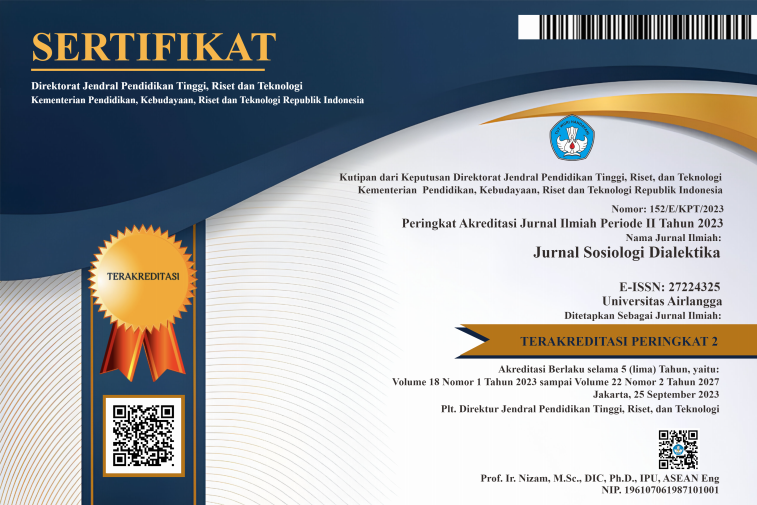Lifestyle changes in rural communities through spatial reproduction practices: A case study in Madiun Regency
Downloads
The production of space in rural areas as a result of modernization changes lifestyles not only within families but also at a broader level, namely between communities. This study aimed to examine how spatial reproduction occurs in villages in Madiun Regency by identifying the dominant agent and the stages of the process of spatial reproduction. This study employed qualitative methods. This study found that there are four stages in the spatial reproduction process in Madiun Regency, including outreach, coordination, mutual cooperation, and synergy. These four stages occurred because of the presence of the village head as the initiating agent and Village Owned Enterprises (BUMDes) and the Tourism Awareness Group as organizations that oversee various community activities in the tourism sector. According to the findings of this study, technology has accelerated the process of spatial reproduction, which is reflected in the existence of four regionalizations, including economic, social, housing, and public services. This study concludes that the reproduction of space does not always lead to conflict and social inequality in society. On the contrary, people are able to work together in building shared prosperity with the value of mutual cooperation.
Achmad ZA (2020) Anatomi teori strukturasi dan ideologi jalan ketiga Anthony Giddens. Translitera 9 (2):45-62. https://doi.org/10.35457/translitera.v9i2.989.
Ajani A & van der Geest K (2021) Climate change in rural Pakistan: Evidence and experiences from a people-centered perspective. Sustainability Science 16: 1999-2011. https://doi.org/10.1007/s11625-021-01036-4.
Akhirul A, Witra Y, Umar I, & Erianjoni E (2020) Dampak negatif pertumbuhan penduduk terhadap lingkungan dan upaya mengatasinya. Jurnal Kependudukan dan Pembangunan Lingkungan 1 (3):76-84.
Babbage DR, Van Kessel K, Terraschke A, Drown J, & Elder H (2020) Attitudes of rural communities towards the use of technology for health purposes in New Zealand: A focus group study. BMJ open 10 (6):e037892. http://doi.org/10.1136/bmjopen-2020-037892.
Badan Pusat Statistik (2020) Persentase penduduk daerah perkotaan menurut provinsi tahun 2010-2035. Badan Pusat Statistik. [Accessed 15 February 2023]. https://www.bps.go.id/statictable/2014/02/18/1276/persentase-penduduk-daerah-perkotaan-hasil-proyeksi-pendudukmenurut-provinsi-2015---2035.html.
Badan Pusat Statistik (2022) Jumlah desa/kelurahan menurut provinsi tahun 2022. Badan Pusat Statistik [Accessed 26 February 2023]. https://www.bps.go.id/indikator/indikator/view_data_pub/0000/api_pub/bEVXU252SU9hTjBxWEU3Z2NpS1ZPQT09/da_02/1.
Badan Pusat Statistik (2023) Jumlah penduduk pertengahan tahun (Ribu jiwa), 2020-2022. Badan Pusat Statistik. [Accessed 15 February 2023]. https://www.bps.go.id/indicator/12/1975/1/jumlahpenduduk-pertengahan-tahun.html.
Bakhtar S & Abizade E (2020) Analysis of the impact of lifestyle changes on the villager housing pattern (Case study: Kandovan Village). Jurnal od Studies of Human Settlements Planning 17 (2):391-402.
Bögel PM, Augenstein K, Levin-Keitel M, & Upham P (2022) An interdisciplinary perspective on scaling in transitions: Connecting actors and space. Environmental Innovation and Societal Transitions 42: 170-183. https://doi.org/10.1016/j.eist.2021.12.009.
CNN Indonesia (2018) Wisata digital dan wisata embara demi gaet turis millenial. [Accessed 26 February 2023]. CNN Indonesia, 6 April. https://www.cnnindonesia.com/gayahidup/20180406133142-269-288798/wisata-digital-dan-wisata-embara-demi-gaet-turismillennial.
Daher IS (2019) Peran agen perubahan sebagai pelaku pembangunan dalam pengembangan kelompok sosial di wisata Desa Sidoluhur. Diklus: Jurnal Pendidikan Luar Sekolah 3 (1):8-13.
Dalla Torre C, Ravazzoli E, Dijkshoorn-Dekker M, Polman N, Melnykovych M, Pisani E, & Secco L (2020) The role of agency in the emergence and development of social innovations in rural areas. Analysis of two cases of social farming in Italy and The Netherlands. Sustainability 12 (11):4440. https://doi.org/10.3390/su12114440.
Dewandaru B, Rahmadi AN, & Sya'idah EH (2019) Pemanfaatan remitansi pekerja migran Indonesia serta peran usaha pekerja migran Indonesia purna untuk pembangunan desa asal. Warmadewa Economic Development Journal (WEDJ) 2 (2):44-50.
Direktorat Jenderal Kependudukan dan Pencatatan Sipil Kementerian Dalam Negeri Republik Indonesia (2022) Dukcapil Kemendagri rilis data penduduk semester I tahun 2022, naik 0,54% dalam waktu 6 bulan. Dukcapil Kemendagri, 31 August. [Accessed 15 February 2023]. https://dukcapil.kemendagri.go.id/berita/baca/1396/dukcapil-kemendagri-rilis-data-penduduk-semester-i-tahun2022-naik-054-dalam-waktu-6-bulan.
Giddens A (2010a) Metode Sosiologi: Kaidah-Kaidah Baru. Yogyakarta: Pustaka Pelajar.
Giddens A (2010b) Teori Strukturasi: Dasar-Dasar Pembentukan Struktur Sosial Masyarakat. Yogyakarta: Pustaka Pelajar.
Guo Q, He Z, Li D, & Spyra M (2022) Analysis of spatial patterns and socioeconomic activities of urbanized rural areas in Fujian Province, China. Land 11 (7):969. https://doi.org/10.3390/land11070969.
Harini S & Wicaksono AG (2019) Manfaat penggunaan pranata mangsa bagi petani Desa Mojoreno Kabuppaten Wonogiri. Jurnal INADA: Kajian Perempuan Indonesia di Daerah Tertinggal, Terdepan, dan Terluar 2 (1):82-97. https://doi.org/10.33541/ji.v2i1.1039.
Hendra D (2018) Analisis pemikiran Henri Levebvre tentang ruang dalam arsitektur modern: Suatu perspektif sosiologis. Jurnal Ilmiah Mimbar Demokrasi 17 (2):178-192. https://doi.org/10.21009/jimd.v17i2.9092.
Hidayah SR (2017) Perubahan sosial masyarakat pedesaan menuju masyarakat sub-urban. Dinamika Sosial Budaya 23 (2):344-348.
Lazarte A (2017) Understanding the driverds of rural vulnerability. Employment Working Paper No.214. International Labour Organization. https://www.ilo.org/wcmsp5/groups/public/---ed_emp/documents/publication/wcms_568736.pdf.
Levebfre H (1974) The Production of Space, translated by Nicholson-Sith Donald (1993). Oxford: Blackwell Publisher.
Liu L, Gao X, Zhuang J, Wu W, Yang B, Cheng W, & Deng O (2020) Evaluating the lifestyle impact of China's rural housing land consolidation with locational big data: A study of Chengdu. Land Use Policy 96: 1-9. https://doi.org/10.1016/j.landusepol.2020.104623.
Manuschevich D, Gurr M, & Ramirez-Pascualli CA (2020) Nostalgia for la montaña: The production of landscape at the frontier of chilean commercial forestry. Journal of Rural Studies 80: 211-221. https://doi.org/10.1016/j.jrurstud.2020.09.010
Marta J, Fauzi A, Juanda B, & Rustiadi E (2019) Migrasi desa-kota di Indonesia: Keputusan, pola dan perilaku serta konsekuensi. https://202.124.205.241/handle/123456789/103346.
Musta'id A (2019) Analisis penanggalan Jawa Pranata Mangsa terhadap sirkulasi monsun dalam perspektif klimatologi: Studi di Kecamatan Undaan Kabupten Kudus. Thesis, UIN Walisongo Semarang, Semarang. http://eprints.walisongo.ac.id/id/eprint/9720/.
Mutunga IM (2018) Exploring the effect of mobile phone on smallholder farmers' livelihood. Jurnal Komunikasi Islam (Journal of Islamic Comunication) 7 (2):173-208. https://doi.org/10.15642/jki.2017.7.2.173-208.
Ohy G, Kawung EJ, & Zakarias JD (2020) Perubahan gaya hidup sosial masyarakat pedesaan akibat globalisasi di desa rasi kecamatan ratahan kabupaten minahasa tenggara. HOLISTIK, Journal of Social and Culture13 (3).
Pison G (2019) The population of the world (2019). Population et sociétés (569):1-8. https://hal.science/hal-02463404.
Puspitasari D & Ruwaida I (2021) Relasi sosial agen-struktur dalam gerakan koalisi masyarakat sipil anti kekerasan seksual pendukung pengesahan RUU-PKS. Jurnal Sains Sosio Humaniora 5 (1):665-681.
Putra MJA, Sinaga O, & Bainus A (2018) Peran unit counter trafficking International Organization for Migration (IOM) dalam Menangani Ancaman Keamanan Non-Tradisional (Perdagangan TKI ilegal) di Provinsi NTB. Dinamika Global: Jurnal Ilmu Hubungan Internasional 3 (2). https://doi.org/10.36859/jdg.v3i02.78.
Qi Z (2019) An overview of rural to urban migration in China and social challenges. Migration Letters 16 (2):273-282. https://doi.org/10.33182//ml.v16i2.664.
Raj N & Shekhar R (2022) Impact of internet on rural lifestayle in Bihar, India. Journal of Datta Meghe Institute of Medical Sciences University 17 (3):680-683. https://doi.org/10.4103/jdmimsu.jdmimsu_334_20.
Rashid MFA, Muhamad AK, Rashid K, Ahmad AL, & Azman MAA (2021) Formulation of a Malaysia modern rural development framework: Synergising rural for change. Planning Malaysia 19 (2):14-26. https://doi.org/10.21837/pm.v19i16.948.
Ritzer G (2011) Teori Sosiologi dari Sosiologi Klasik sampai Perkembangan Terakhir Postmodern. Yogyakarta: Pustaka Pelajar.
Rizaty MA (2021) Sebanyak 56,7% penduduk Indonesia tinggal di perkotaan pada 2020. [Accessed 15 February 2023]. Databoks Katadata, 18 August. https://databoks.katadata.co.id/datapublish/2021/08/18/sebanyak-567-penduduk-indonesia-tinggal-di-perkotaan-pada-2020.
Rongna A & Sun J (2022) Tourism livelihood transition and rhythmic sustainability: The case of the Reindeer Evenki in China. Annals of Tourism Research 94. https://doi.org/10.1016/j.annals.2022.103381.
Sacco PL, Ghirardi S, Tartari M, & Trimarchi M (2019) Two versions of heterotopia: The role of art practices in participative urban renewal processes. Cities 89: 199-208. https://doi.org/10.1016/j.cities.2019.02.013.
Seguin R, Folta S, Marshall G, Graham M, & Strogatz DS (2019) The effect of a community-based healthy lifestyle behavior change program on simple 7 score among rural women. Circulation 139 (Suppl_1). https://doi.org/10.1161/circ.139.suppl_1.P144.
Stehlik D (2016) Rural lifestyle, community well-being and social change: Lesson from country Australia for global citizen. Rural Society 25 (1):74-85. https://doi.org/10.1080/10371656.2016.1152038.
Supriadi S (2017) Teori strukturasi Anthony Giddens. Jurnal Ilmu Komunikasi 5 (1):52-76.
Vorobyov S & Bugai Y (2019) Factors of socio-economic development of rural areas. IOP Conference Series: Earth and Environmental Science 395 (1). https://doi.org/10.1088/1755-1315/395/1/012109.
Wibowo A, Muhammad DRA, Lestari E, & Karsidi R (2021) Development of a tourism village based on the integration of language education and local potential (Case study in Karanganyar Regency, Central Java, Indonesia). E3S Web of Conferences 316: 04003. https://doi.org/10.1051/e3sconf/202131604003.

This work is licensed under a Creative Commons Attribution-NonCommercial-ShareAlike 4.0 International License.
1. Copyright of this journal is possession of Editorial Board and Journal Manager, by the knowledge of author, whilst the moral right of the publication belongs to the author.
2. Legal formal aspect of journal publication accessibility refers to Creative Commons Attribution-NonCommercial-ShareAlike (CC BY-NC-SA), implies that publication can be used for non-commercial purposes in its original form (cannot be modified).
3. Every publications (printed/electronic) are open access for educational purposes, research, and library. Other that the aims mentioned above, editorial board is not responsible for copyright violation.















